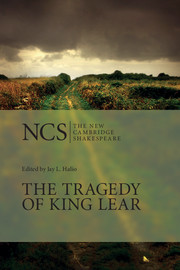Introduction
Summary
Date and sources of Shakespeare's King Lear
KING LEAR: DATE OF COMPOSITION AND FIRST PERFORMANCE
Although King Lear was probably performed earlier at the Globe, the first recorded performance of the play was at the court of King James I on St Stephen's Day during the Christmas holidays in 1606, as indicated in the Stationers’ Register (26 November 1607) and proclaimed on the title page of the first quarto (1608). Both the king and the playwright must have brought to the performance a keen sense of occasion. Shakespeare was a leading member of the company of actors honoured by royal patronage, the King's Men, and he knew that his play touched on a number of sensitive issues. In his first parliament, James had declared his intention of uniting the kingdoms of Scotland and England as one realm, Great Britain, restoring the ancient title and unity to the land. While he received considerable support from the lords and judges, the commons were hesitant and did not jump to ratify the proposal. Against this background of political activity, Lear's speech, ‘Know, that we have divided / In three our kingdom’, must have been startling indeed. James was in a position to see, however, that similar material had attracted theatrical attention as early as Sackville and Norton's Gorboduc (1561) and Locrine (c. 1585) as well as King Leir (c. 1590); moreover, he would quickly have recognised that Shakespeare's play vividly dramatised the tragic consequences of dividing the kingdom, as opposed to unifying it.
Composition of King Lear had begun by spring or summer 1605, possibly sooner. Gloucester's references to ‘These late eclipses in the sun and moon’ (1.2.91)may allude to actual eclipses in September and October 1605. The anonymous play, ‘The moste famous Chronicle historye of Leire kinge of England and His Three Daughters’, first entered in the Stationers’ Register on 14 May 1594 but performed earlier, was again entered (as ‘the Tragecall historie’) on 8 May 1605 and published, presumably for the first time, later that year. If Shakespeare's play was responsible for the revival of interest in the old play, whose title page proclaims that it was ‘diuers and sundry times lately acted’, then King Lear must have been on the boards by early 1605.
- Type
- Chapter
- Information
- The Tragedy of King Lear , pp. 1 - 94Publisher: Cambridge University PressPrint publication year: 2005



